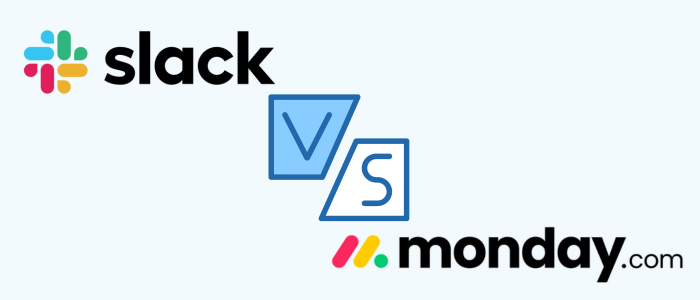What is Slack?
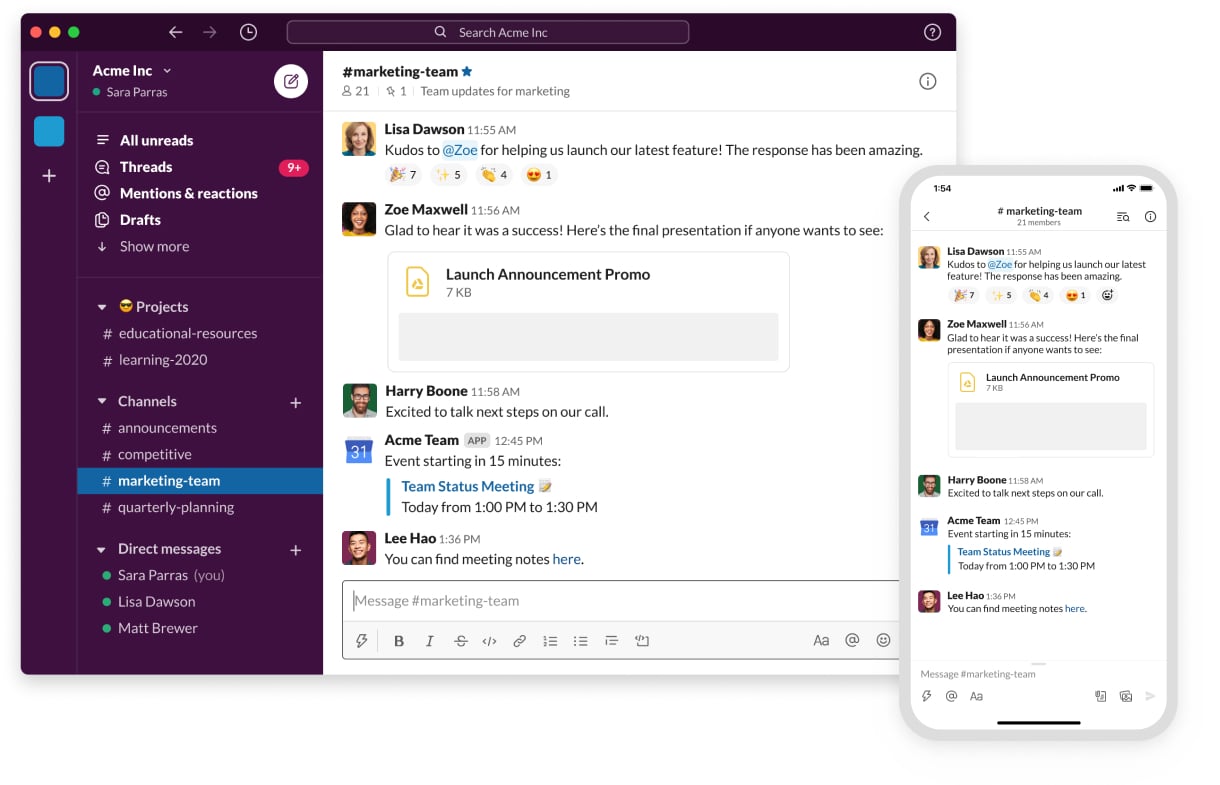
Slack is a cloud-based team communication platform that lets you work with your team anywhere, anytime, and in any way you want. It connects with thousands of other apps, making it an adaptable team collaboration software.
Slack facilitates team collaboration. You can use it to:
- Chat in real time through invite-only channels or direct messages
- Send audio and video clips
- Share files
- Talk on live video or voice calls (via huddles), and more
The following is a comprehensive overview of Slack's core features and how they can help you reach your communication objectives.
[Related article: 24 Remote Work Tools & Software For Teams Working From Home In 2024]
Here you can see our most powerful CRM systems for your business for various industries:
-Mar-27-2024-12-44-59-5129-PM.png)
Salesforce
Salesforce is an industry leader known for its mammoth feature set and endless customization options. The platform can adapt to any industry, from manufacturing to insurance.
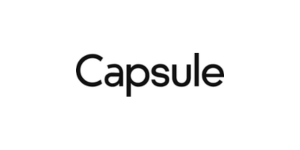
Capsule
Capsule is a cloud-based CRM platform that helps businesses build relationships with customers. It enables users to store contacts, track sales opportunities, automate workflows and manage projects.
-Mar-27-2024-12-45-09-7283-PM.png)
Pipedrive
Pipedrive CRM is a user-friendly platform that is effortless to master. It is the creative web designer's secret weapon in the world of Customer Relationship Management.
-Mar-27-2024-12-45-00-9156-PM.png)
Zoho
It is a web-based email marketing management service for small and medium businesses. It automates the entire marketing process - from managing your email marketing campaign to maintaining mailing lists.
Slack Key Features
1. Dynamic Communication Hub
Experience real-time communication through various channels, including direct chat, project-specific discussions, shared channels, and live audio or video calls. Elevate your conversations with interactive elements such as reactions, emojis, GIFs, and @mentions.
2. Canvas for Seamless Collaboration
Slack transforms into more than just a messaging tool with its Canvas feature, offering a centralized space for project management, organization, and collaboration. Create custom canvases for tasks like meeting notes, projects, or checklists, and effortlessly share them in relevant Slack channels for enhanced teamwork. Leverage pre-set templates for quick and efficient planning, from employee onboarding to product briefs.
3. Apps and Integrations
Enjoy a seamless integration with over 2600+ collaboration and productivity apps, including Google Drive, Microsoft Teams, HubSpot, Gmail, and many more. Explore the app directory to enhance your Slack experience. Take it a step further by building custom apps using Slack APIs, like using Polly to run polls or quizzes during conversations.
4. Automation with Workflow Builder
Slack goes beyond messaging with its no-code Workflow Builder, allowing you to automate processes effortlessly. Utilize drag-and-drop functions to turn everyday tasks into streamlined workflows. For instance, optimize team communication with asynchronous stand-up meetings using Slack Canvas. Share updates, create a standardized format, and post updates at your convenience. The canvas becomes a comprehensive record of progress, fostering collaboration despite differing schedules and time zones.
Leverage Slack’s no-code workflow builder to automate processes using functions, conditions, and triggers. Craft custom mini-apps (Slack bots) with the Slack API, and make the most of developer tools for simplified development processes.
In essence, Slack empowers you to communicate effectively, collaborate seamlessly, and stay informed about ongoing tasks—all while adapting to various schedules and time zones.
[Related article: 10 Best Customer Retention Management Software]
What is Monday?
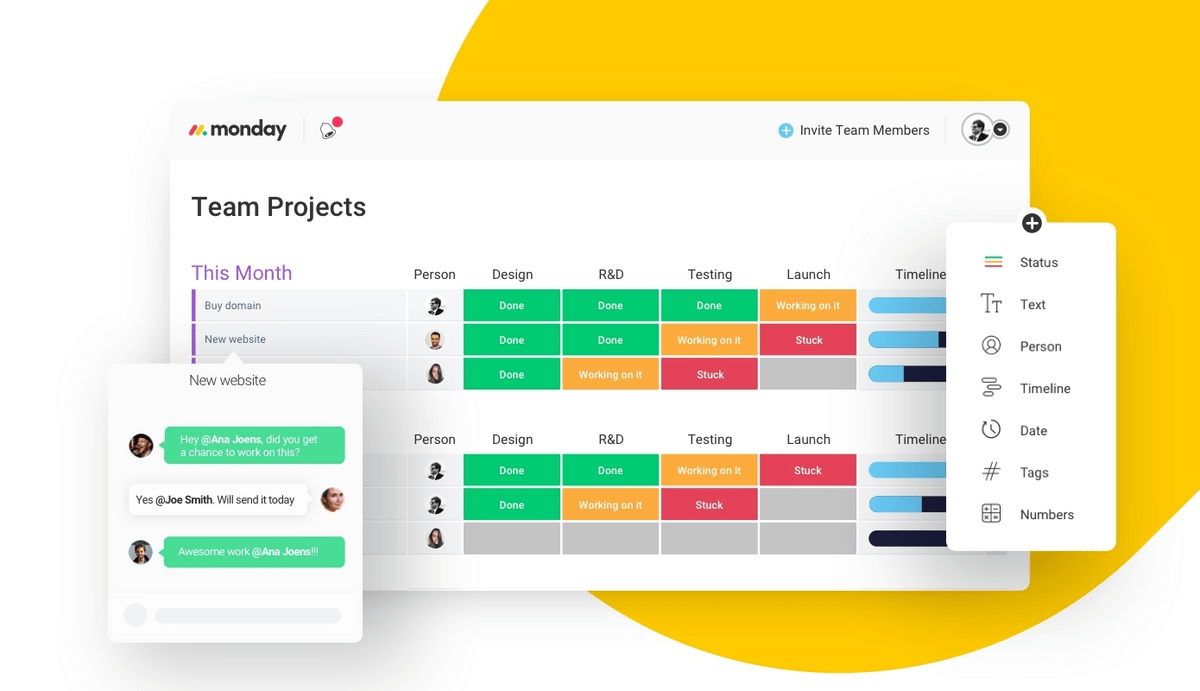
monday.com, usually known as monday, is a comprehensive project management and collaboration platform. Its customizability makes it a must-have application for project management and optimizing business procedures.
Unlike Slack, the software is more focused on management than collaboration. Work with user-friendly dashboards, task management boards, and flexible workflows.
monday also includes a separate app marketplace for widgets and third-party applications. It can be used to expand and improve the capabilities of monday WorkOS.
However, you may also pay attention to these powerful alternatives:
Monday Key Features
1. User-Friendly Interface
Try the simplicity of monday.com's WorkOS, designed for visual appeal and intuitive navigation. Project management becomes a breeze with drag-and-drop functionality and click-and-done tools—no coding required. Easily customize your dashboard by effortlessly adding items, widgets, visuals, and team members. Enhance it further with resource management widgets like time tracking and workload indicators, all at your fingertips. Explore monday's extensive gallery of 200+ pre-built templates, ensuring you never have to start from scratch.
2. Seamless Collaboration with WorkDocs
Dive into collaborative excellence with monday.com's WorkDocs, featuring real-time updates, file sharing, and seamless communication. Co-edit documents in real-time, share instant comments, and engage with team members within a single document. Take collaboration to the next level by transforming text into actionable items on any monday.com board, ensuring a smooth workflow.
3. Versatile Management Tools
Optimize your workflow with customizable dashboards and boards offering various views such as Kanban, calendar, timeline, Gantt chart, and more. Tailor these tools to meet the unique needs of your team, project, or business. Choose from over 30+ custom widgets for a holistic project overview, covering aspects like time tracking, workflow analysis, and performance measurement.
4. Extensive Apps and Integrations
Explore monday.com's robust app directory with 200+ third-party apps, spanning communication, marketing, ERPs, CRMs, and more. Benefit from seamless integrations with popular apps like Slack, Google Calendar, MailChimp, HubSpot, and other essential tools, enhancing the versatility of your workspace.
5. Effortless Automation and Workflows
monday's WorkOS introduces a user-friendly, no-code workflow builder complemented by over 200+ pre-built automation templates. Whether you prefer ready-made solutions or crave customization, automate workflows effortlessly based on events, actions, or functions.
Experience the monday advantage—where user-friendly design meets collaborative excellence, versatile management, extensive integrations, and effortless automation. Transform your work processes with the dynamic features of monday.
[Related article: An Introduction to Monday.com: What Is It and How Does It Work?]
Slack vs Monday: Comparison Chart
| Criteria |
Slack |
monday.com |
| Dashboards |
❌ |
✅ |
| Real-time Chat |
✅ |
❌ |
| File Sharing |
✅ |
✅ |
| Visualizations |
❌ |
✅ |
| Customizations |
❌ |
✅ |
| Templates |
❌ |
✅ |
| Automation |
✅ |
✅ |
| Bot Framework |
✅ |
❌ |
| Free plan |
✅ |
✅ |
| Pricing |
Starts at $7.25 per month per active user |
Starts at €9 per month per active user |
Main Differences Between Slack vs Monday
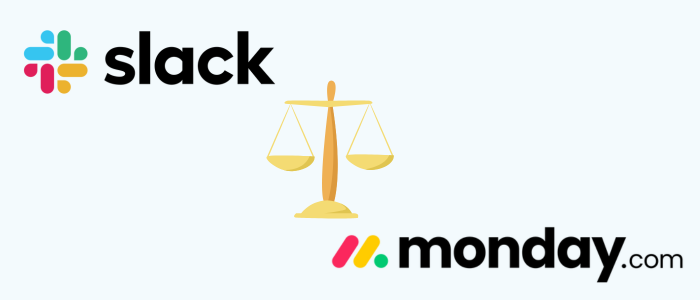
Here are several differences between monday and Slack:
- Slack primarily focuses on enhancing team communication and engagement, while monday.com is a comprehensive project management platform.
- Slack appeals to a broader range of businesses seeking improved communication, whereas monday.com targets businesses in need of robust project management capabilities.
- Slack is ideal for businesses prioritizing communication enhancements, while monday.com caters to those seeking an all-in-one tool for project management.
- Slack boasts engaging discussion features like GIFs, fostering lively interactions. In contrast, monday.com, while user-friendly, lacks such entertaining elements.
- Slack offers in-app video calling functionality, while monday.com is expanding its communication features and integrations, such as with Zoom, to provide a more comprehensive solution.
In summary, Slack excels in fostering communication and engagement, while monday.com stands out as a robust project management solution. Understanding these differences can help businesses choose the platform that best aligns with their specific needs and objectives.
[Related article: Mastering To-Do Lists with Monday.com for Personal Tasks]
Similarities Between Slack and Monday
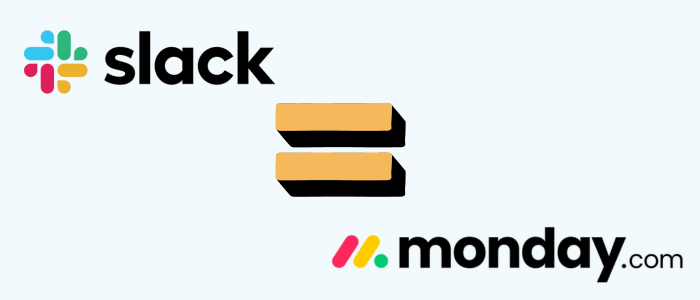
Slack and monday.com, despite serving different primary functions, share several similarities:
- Collaborative tools: Both platforms are designed to facilitate collaboration within teams. Slack offers real-time messaging, file sharing, and integrations with various apps, while monday.com provides tools for project management, task assignment, and progress tracking. Both platforms aim to streamline communication and enhance teamwork.
- User-friendly interfaces: Slack and monday.com prioritize user experience, offering intuitive interfaces that are easy to navigate. Whether it's setting up channels and workspaces in Slack or creating boards and workflows in monday.com, users can quickly adapt to the platforms and start collaborating efficiently.
- Integration capabilities: Both platforms support integrations with third-party apps and services, allowing users to connect their favorite tools seamlessly. Slack integrates with a wide range of apps such as Google Drive, Trello, and Zoom, while monday.com offers integrations with tools like Jira, Microsoft Teams, and Salesforce. This flexibility enables users to customize their workflows and centralize their work processes.
- Scalability: Both Slack and monday.com are scalable solutions that can accommodate teams of various sizes. Whether it's a small startup or a large enterprise, both platforms offer pricing plans and features suitable for different organizational needs. Additionally, both platforms provide options for customization and expansion as teams grow and evolve.
- Customer Support: Both Slack and monday.com prioritize customer support, offering resources and assistance to help users make the most of their platforms. From comprehensive help centers and FAQs to responsive customer service teams, both platforms aim to provide users with the support they need to succeed.
In summary, while Slack and monday.com serve different purposes—Slack focuses on communication and collaboration, and monday.com on project management—they share common ground in terms of user-friendliness, integration capabilities, scalability, and customer support, making them valuable tools for modern teams seeking to enhance productivity and teamwork.
[Related article: Best Customizable CRM Software: 10 Best Solutions for 2024]
Slack vs Monday: Features
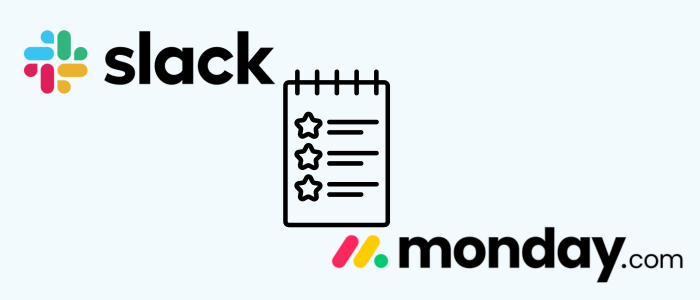
Both monday and Slack offer robust features tailored to different aspects of team collaboration and project management. Let's compare their features to see which platform might be better suited for your needs.
monday Features:
- Simplified project creation and user assignment.
- Versatile display options with multiple views for project information.
- Users can share boards, facilitating easy collaboration and project tracking.
[Related article: Setting Up and Managing Monday.com — Workspaces Basics Explained]
Slack Features:
- Customizable bots to automate responses to frequently asked questions.
- Centralized access to channels and direct messages for seamless communication.
- Audio calls directly within the app for convenient communication.
Differentiating Features:
- Slack offers audio calls directly on the app, while monday requires integration with apps like Twilio for phone calls.
- Slack provides real-time chat functionality, whereas monday does not.
- monday offers surveys, a feature not available in Slack.
In summary, both platforms offer extensive features, but their focus areas differ. monday excels in project management with easy project creation, versatile display options, and unique board-sharing capabilities. On the other hand, Slack shines in communication with customizable bots, centralized messaging, and in-app audio calls. Depending on your specific needs, one platform may offer features that better align with your workflow and preferences.
Monday vs Slack: Customer Support
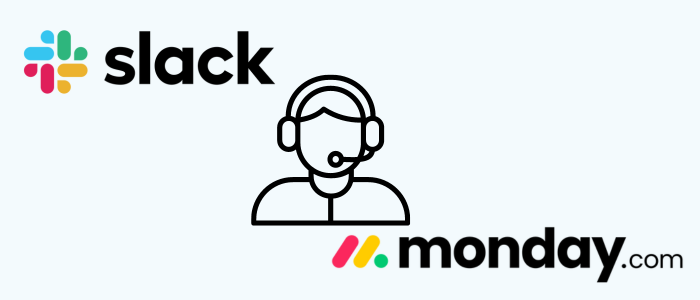
Both monday and Slack provide strong customer support options, each with its own unique strengths.
monday's Customer Support:
- Users praise monday's support team for their prompt and personalized assistance, connecting users directly with human representatives.
- Support options include filling out an email form or directly emailing the support team.
- monday's customer support operates 24/7, ensuring assistance is available whenever needed.
- The platform offers a robust resource center and extensive video library to help users navigate their system and address common questions effectively.
Slack's Customer Support:
- Slack also offers an extensive resource center and FAQ section on their Contact Us page, providing users with helpful information.
- Users appreciate Slack's quick response to tickets, typically within an hour, demonstrating their commitment to resolving technical issues promptly.
In summary, both platforms excel in providing valuable customer support. monday stands out with its 24/7 availability and personalized assistance, while Slack impresses with its quick response times and comprehensive resources. Ultimately, users can rely on either platform to receive prompt assistance and access helpful educational materials, ensuring a positive support experience.
Slack vs Monday: Pricing Plans
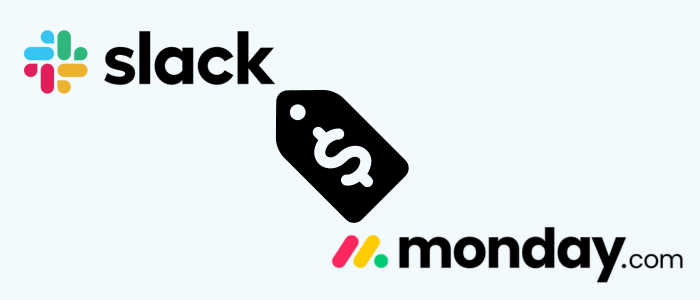
Slack offers the following pricing plans:
- Free plan: Offers basic features including 10,000 messages, audio and video calls, and integrations with apps like Office 365 and Google Drive.
- Pro: $$7.25/month per active user (billed annually), providing additional features such as full messaging history, group voice and video calls, unlimited integrations, and more.
- Business+: $12.50/month per active user (billed annually), offering enhanced features beyond the Standard plan.
- Enterprise Grid: Custom pricing is available upon contacting sales.
monday.com provides you with five pricing tiers:
- Free plan: Offers basic functions for up to 2 users, up to 3 boards, unlimited docs, 200+ templates, and 8 column types.
- Basic: €9/month per active user (billed annually), providing essential features including communication tools, unlimited free viewers, items, 5GB file storage, and prioritized customer support.
- Standard: €12/month per active user (billed annually), offering advanced features like shared boards with guests, calendar and timeline views, automation, advanced search, and more.
- Pro: €19/month per active user (billed annually), with additional features tailored for larger teams and more complex projects.
- Enterprise: Custom pricing is available upon contacting sales.
Slack's advantage lies in its more affordable prices, which offer flexibility for most teams. Its Free plan is useful and comprehensive, but upgrading to the Standard plan unlocks even more features, providing excellent value for the money.
While monday`s Basic plan offers robust features, users can fully experience the platform's benefits with the Standard plan.
Both platforms offer pricing based on team size, ensuring scalability for growing businesses.
Slack's free plan makes it a compelling choice for teams of all sizes, with seamless upgrade options for enhanced features. monday.com's pricing structure caters to various needs, with the Standard plan offering comprehensive features for effective project management.
Ultimately, the choice between Slack and monday.com depends on the specific requirements and preferences of each team, with both platforms offering valuable solutions for collaboration and productivity.
Monday or Slack: What to choose?
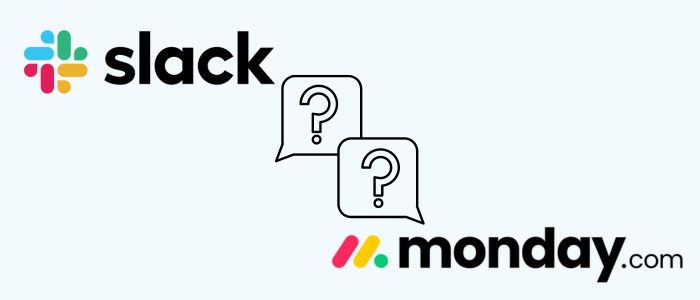
In conclusion, while Slack and monday cater to different aspects of team collaboration and productivity, they share numerous similarities that make them valuable tools for modern workplaces.
Whether it's facilitating real-time communication, managing projects efficiently, or integrating with other essential tools, Slack and monday empower teams to work together seamlessly and achieve their goals effectively.
Ultimately, the choice between Slack vs monday.com depends on the specific needs and preferences of each team, but rest assured, both platforms offer powerful solutions to enhance teamwork and productivity.
